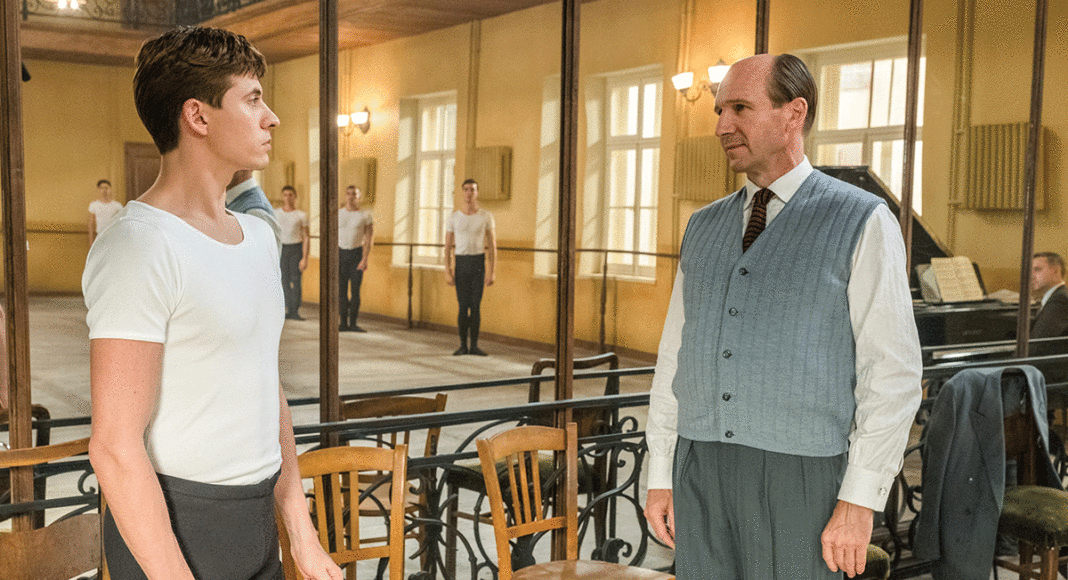The Russian expression “white crow” indicates an outsider—someone extraordinary, not like the others. So we’re told in the biopic The White Crow, and all of those meanings certainly apply to the movie’s subject, legendary ballet star Rudolf Nureyev.
The script was written by playwright David Hare, from a story idea he workshopped extensively with the film’s director Ralph Fiennes, who also has a small acting role. In celebrating the spectacular otherness of their subject, they focus on events surrounding Nureyev’s defection to the West in 1961, the wrenching moment when the 23-year-old dancer had to choose permanent exile from his Russian homeland to escape Soviet oppression and declare himself a citizen of the world.
Fiennes has said it was the intensity of this choice that attracted him to Nureyev’s story. But as inherently powerful as the story is, the storytelling is sometimes a little flabby—unlike Nureyev himself, or the young Ukrainian dancer, Oleg Ivenko, who plays him in the movie. The decision to divide the story into three intersecting time frames works well enough, but many scenes could have been pruned for the sake of clarity, or discarded, to shape the narrative toward more dramatic tension.
Still, the movie effectively presents the struggle of artistic integrity against political control. When Nureyev (Ivenko) arrives in Paris in 1961 as a member of the Kirov Ballet on a tour of the West, the dancers are kept on a short leash by their KGB handlers. When Rudi goes off on his own to explore the city (always shadowed by two agents) instead of boarding the hotel bus with the others, company director Sergeyev retaliates by not casting him in any role in their opening night performance.
But Rudi performs with extra brilliance when he makes his debut the next night, bringing the audience to its feet. As his reputation soars, he spends his days feeding on Western culture at the Louvre and befriending other young movers and shakers about town, like socialite Clara Saint (Adele Exarchopoulos), recently bereaved fiancée to the son of Culture Minister Andre Malreaux. (She also takes Rudi to a cabaret girlie show, which he loves.)
Intercut with scenes of Rudi reveling in the freedom of Paris are chiaroscuro scenes from his childhood (he was literally born on a train to Siberia, where his mother was going to visit his government-official father), and his youth at the Mariinsky Dance School in St. Petersburg. There, he’s mentored by ballet master Pushkin (Fiennes), and his younger wife Xenia (Chulpan Khamatova), who invite him to live with them while he recovers from an injury. Rudi also hooks up with East German dance student Teja Kremke (Louis Hofmann), who becomes his first love and obsessively records many of Rudi’s performances on his home movie camera—grainy images that appear during the closing credits.
In Fiennes’ last directorial outing, the admirable The Invisible Woman, he cast himself in the lead role of Charles Dickens. He gives himself much less to do this time, playing Pushkin as a man so soft-spoken and self-effacing that he practically evaporates off the screen. It’s a thankless part in many ways; when the plot puts him on a collision course with reckless Rudi, Pushkin politely declines to collide. But he does get to play the Yoda-like sage, advising his pupil that mere technique is not as important as “story”—a lesson that Rudi, with his innate flair for the dramatic, takes to heart.
But a scene where the boy Rudi walk into the woods with his silent father goes nowhere. And a sudden, hurtful outburst of arrogance that almost costs Rudi his friendship with Clara is presented without context. Still, Paris looks great (including the glorious stained glass of Sainte-Chapelle). And Fiennes delivers the climactic scene at Le Bourget Airport, where Rudi makes his impulsive “leap for freedom,” with enough intensity to dispel the earlier missteps.
THE WHITE CROW
*** (out of four)
With Oleg Ivenko, Ralph Fiennes and Adele Exarchopoulos. Written by David Hare. Directed by Ralph Fiennes. A Sony Classics release. Rated R. 127 minutes. In Russian, English and French.













